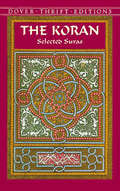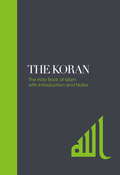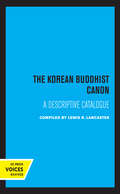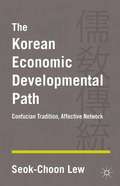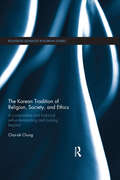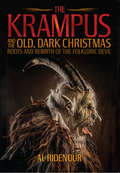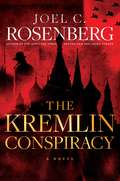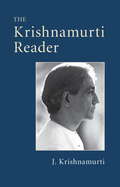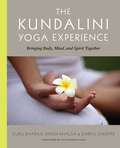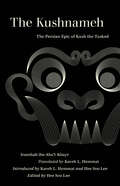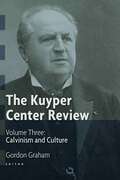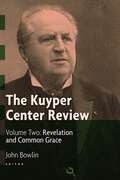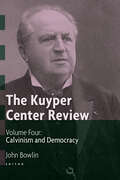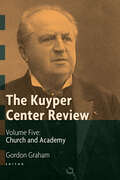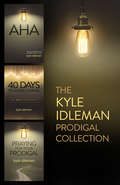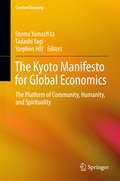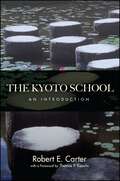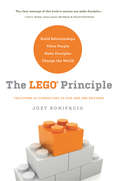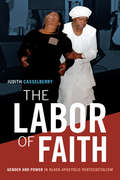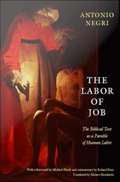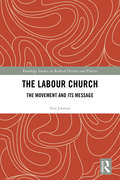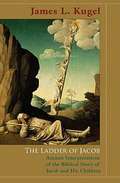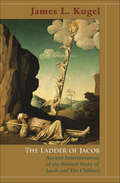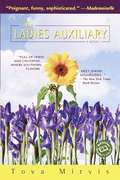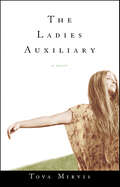- Table View
- List View
The Koran: Selected Suras (Dover Thrift Editions: Religion Ser.)
by Arthur JefferyThe Koran is the sacred scripture of Islam, a collection of revelations that Mohammed, the Prophet, said he had received from God (through the angel Gabriel) in seventh-century Arabia. Mohammed preached these revelations in rhymed verses that comprised suras, or chapters. Shortly after his death, his followers published the suras as the Koran (an adaptation of a word meaning "scripture lesson"), which today is considered one of the great sacred books of the world. Deeply moralistic, full of passion and fervor, the suras deal with such topics as the omniscience and majesty of God, death and judgment, the proper conduct of the faithful, stories of previous prophets, kindness to orphans, and much more.The complete Koran consists of 11 suras — arranged from longest to shortest — plus an opening prayer and two closing charms. The selections in the present volume were carefully chose to give a cross-section of the whole and to illustrate Mohammed's teaching as it developed from the rhapsodic style of his early Meccan period to the workaday legislative material of the Medinan period. This excellent English translation replaces the original verse form with accurate, highly readable prose, making a treasury of eternal wisdom from the Koran accessible to both the novice and the serious student.
The Koran: The Holy Book of Islam with Introduction and Notes
by E. H. PalmerA wonderful translation of the most important Muslim text, The Koran, The Holy Bible of Islam, which was revealed to the Prophet Muhammad.The Koran, literally meaning ‘The Recitation’ it is the central religious text for Muslims. Muslims believe the Koran was verbally revealed by God to the Prophet Muhammad in Arabic through the angel Gabriel over a period of approximately 23 years Muslims regard koranic revelations as the sacred word of God, intended to correct any errors in previous holy books such as the Old and New Testaments. The Koran is accepted as the foundation of Islamic law, religion, culture and politics. Some Koranic fragments have been dated as far back as the eighth, and possibly even the seventh, century. The oldest existing copy of the full text is from the ninth century. Although early variants of the Koran are known to have existed, Muslims believe that the text we have today was established shortly after the death of the Prophet by the Caliph Uthman. This superb translation by E.H.Palmer brings an appealing clarity to this ancient and revered text.
The Korean Buddhist Canon: A Descriptive Catalogue (Center for Korean Studies, UC Berkeley #4)
by Lewis R. LancasterThis title is part of UC Press's Voices Revived program, which commemorates University of California Press’s mission to seek out and cultivate the brightest minds and give them voice, reach, and impact. Drawing on a backlist dating to 1893, Voices Revived makes high-quality, peer-reviewed scholarship accessible once again using print-on-demand technology. This title was originally published in 1979.
The Korean Economic Developmental Path
by Seok-Choon LewThis book defines the Korean development as the moral economy of growth derived from a synergy between strong state and strong society and argues that Confucian cultural orientation has played a critical role in the process.
The Korean Tradition of Religion, Society, and Ethics: A Comparative and Historical Self-understanding and Looking Beyond (Routledge Advances in Korean Studies)
by Chai-sik ChungBy making Korea a central part of comparative history of East Asian religion and society, this book traces the evolution of Korean religion from the oldest representation to that of the current day by utilizing wide-ranging interdisciplinary and comparative resources. This book presents a holistic view of the enduring religious tradition of Korea and its cultural and social significance within the wider horizons of modern and globalizing changes. Reflecting nearly five decades of the author’s work on the subject, it presents an understanding of the main current in Korean religion and social thought throughout history. It then goes on to examine discourses on values and morality involving the relationship between religion and society, in particular the human meaning of economy and society, which is one of the most central and practical problems in the contemporary world with global relevance beyond Korea and Asia. Addressing the overview of the Korean religious tradition in the context of its impact on the making of modern society and economy, this book will appeal to students and scholars of Religious Studies, Korean Studies and Asian Studies.
The Krampus and the Old, Dark Christmas: Roots and Rebirth of the Folkloric Devil
by Sean Tejaratchi Al RidenourThe Krampus, a folkloric devil associated with St. Nicholas in Alpine Austria and Germany, has been embraced by the American counterculture and is lately skewing mainstream. The new Christmas he seems to embody is ironically closer to an ancient understanding of the holiday as a perilous, haunted season. In the Krampus' world, witches rule Christmas, and saints can sometimes kill.
The Kremlin Conspiracy
by Joel C. RosenbergSEPTEMBER 1999 A series of apartment bombings in Moscow shock the world. The Russian government immediately blames Chechen terrorists, and Oleg Kraskin—a sharp young lawyer in love with the president's daughter—has no reason to doubt it. Yet when he joins the First Family of Russia, and the president's personal staff, he has no idea how radically the bombings will one day alter the course of world events. Or what role he himself will play. SEPTEMBER 2001 Just after the Twin Towers and the Pentagon are attacked, Marcus Ryker enlists in the Marines and is sent to Afghanistan to defend his country. In time, he joins the United States Secret Service and works his way up to the elite Presidential Protection Detail. It's his dream job, until a tragic accident causes him to rethink his priorities. Neither Marcus nor Oleg is aware of just how much they themselves will change history when their paths cross. Russia's president is a rising czar determined to restore his country to her former greatness—and he will stop at nothing to do so. Even risk nuclear war. Now Marcus has to make the most important decision of his life. Would it ever be right to assassinate a single leader if it could prevent a genocide? If it is, then everything he's learned to protect our president, he'll need to take out theirs.
The Krishnamurti Reader
by J. KrishnamurtiJ. Krishnamurti was renowned for the penetrating insight and immediacy of his spiritual teaching. Radical in his day for seeking truth beyond the boundaries of religion, ideology, or tradition, he declared that "Truth is a pathless land, and you cannot approach it by any path whatsoever." He traveled and lectured throughout the world, calling for a new approach to life and spirituality. In this compilation of Krishnamurti's most essential teachings, he explores what he calls "the art of living." The topics addressed include such perennial human concerns as: living life without conflict and confusion, how to act with skill and clarity, the significance of meditation, death and dying, true freedom, and bringing the sacred into everyday life. These timeless teachings guide us to live our lives simply, intelligently, and with great love--free from the bonds of sorrow and fear.
The Kundalini Yoga Experience: Bringing Body, Mind, and Spirit Together
by Khalsa Dharma Singh Darryl O'KeeffeUNLEASH YOUR POTENTIAL TO LIVE THE LIFE YOU'VE ALWAYS WANTED. Kundalini yoga engages your unique sources of energy -- those that empower your spirit as well as your body. Drawing from the riches of ancient yogic tradition, The Kundalini Yoga Experience offers a system of physical poses, breathing techniques, and focused meditations that, when practiced together, will bring you: Increased physical health and strength; Emotional balance; Heightened sensory awareness; Enhanced intuition and creativity; Greater peace and fulfillment in relationships; A deeper sense of your own spirituality. Unlike any other yoga guide, The Kundalini Yoga Experience encourages you to develop a practice that suits your needs. At the start, a simple numerological profile based on your birth date reveals your strengths and weaknesses. From there, you'll learn which exercises and meditations will be most effective in helping you balance each energy center (or chakra) in your body. Clear instructions and photographs guide you through each step, and as you move from one to another, you'll see how physical movement and spiritual reflection go hand in hand to heal and strengthen every part of you. With regular practice, you'll be surprised at how strong, healthy, and fulfilled you feel. Experiencing the power of Kundalini is your birthright -- embrace it!
The Kushnameh: The Persian Epic of Kush the Tusked
by IranshahThe first English translation of a strange and unusual Persian epic, this action-packed tale of an evil, monstrous king explores questions of nature and nurture and brings the global middle ages to life. The great Persian epic known as the Kushnameh follows the entangled lives of Kush the Tusked––a monstrous antihero with tusks and ears like an elephant, descended from the evil emperor Zahhak––and Abtin, the exiled grandson of the last true Persian emperor. Abandoned at birth in the forests of China and raised by Abtin, Kush grows into a powerful and devious warrior. Kush and his foes scheme and wage war across a global stage reaching from Spain and Africa to China and Korea. Between epic battles and magnificent feasts are disturbing, sometimes realistic portrayals of abuse and oppression and philosophical speculation about nature and nurture and the origins of civilization. A fantastical adventure story stretching across the known world and a literary classic of unparalleled richness, this important work of medieval Persian literature is a valuable source for understanding the history of racism and constructions of race and the flows of lore and legend from the Central Asian Silk Road and the Sahara to the sea routes of the Indian Ocean and the Mediterranean. The Kushnameh is a treasure trove of Islamic and pre-Islamic Persian cultural history and a striking contemporary document of the "global middle ages," now available to English-speaking readers for the first time.
The Kuyper Center Review, Vol 3: Calvinism and Culture
by Gordon GrahamSome religious traditions -- such as Lutheran, Wesleyan, and Eastern Orthodox -- have aesthetically rich resources on which to draw for the renewal of arts in everyday life. In contrast, Calvinism has generally been suspicious of the arts.The essays in this volume attempt to explore new avenues of thought about Calvinism's relation to the arts. Part historical, part theological, and part practical, they offer a wide-ranging exploration of neo-Calvinism's relationship to the arts, both at a general level and in connection with specific art forms. Overall they suggest that the neo-Calvinism espoused by Abraham Kuyper can and should make more of the arts than the traditional view of Reformed Christianity might be thought to allow.Contributors:Clifford B. AndersonJohn BarberJames D. BrattMichael BräutigamJanet DanielsonNeal DeRooJohn De SotoJames EglintonMatthew KaemingkJennifer WangWilliam Baltmanis WhitneyAlbert M. Wolters
The Kuyper Center Review, Volume 2: Revelation and Common Grace
by John BowlinThe Abraham Kuyper Center for Public Theology at Princeton Theological Seminary was established in admiration of Kuyper, whose life as pastor, theologian, journalist, and politician remarkably exemplifies how confidence in the truth of a Christian worldview can be expressed in both theory and practice. The chapters in this book were originally presented at the annual Kuyper Conferences of 2009 and 2010 and are inspired by the themes of those conferences: “Philosophy and Revelation: A Celebration of the Centenary of Herman Bavinck’s 1908-1909 Stone Lectures” (2009) and “Common Grace and ‘A Common Word’” (2010).
The Kuyper Center Review, volume 4: Calvinism and Democracy
by John BowlinExplores the influence of Calvinism on democratic theory and practice Abraham Kuyper (1837-1920) -- pastor, theologian, journalist, and politician -- is highly regarded as exemplifying how a Christian worldview can be confidently expressed in both theory and practice. Honoring the spirit of Kuyper's legacy, The Kuyper Center Review annually publishes substantial essays that relate the tradition of Reformed theology to issues of public life. Kuyper was a principal force, both political and intellectual, behind the democratization of politics and public life that occurred in the Netherlands at the close of the nineteenth century. This volume reflects on that legacy, not only examining its theological roots and historical context but also assessing democracy's prospects in our own day and considering the ways in which Reformed theology might provide resources for democratic criticism and renewal.Contributors: Clifford B. Anderson Michael Brautigam Clay Cooke Michael DeMoor James Eglinton George Harinck Brant Himes David Little Jeffrey Stout Harry Van Dyke
The Kuyper Center Review, volume 5: Church and Academy
by Gordon GrahamAbraham Kuyper (1837–1920) -- pastor, theologian, journalist, politician -- is highly regarded as exemplifying how a Christian worldview can be confidently expressed in both theory and practice. Honoring the spirit of Kuyper’s legacy, The Kuyper Center Review annually publishes substantial essays that relate the tradition of Reformed theology to issues of public life.Few themes are more directly related to Kuyper’s thought than that of church and academy. The essays in this volume examine Kuyper’s vision for a distinctively Christian university and consider what it means today, especially in light of how secularized the Netherlands has become since Kuyper’s time. The contributors explore Kuyper’s understanding of church and academy by placing it in a broader intellectual and theological context and drawing comparisons with other notable theological thinkers. Taken together, these essays show that much can still be learned from Kuyper and his contemporaries.ContributorsH. Russel BotmanMichael BrautigamGijsbert van den BrinkAd de BruijneJavier A. GarciaGordon GrahamMarinus de JongDylan PahmanHarry Van Dyke
The Kyle Idleman Prodigal Collection
by Kyle IdlemanTogether for the first time! Three transformational books from Kyle Idleman.AHA: We've all had "aha!" moments in our lives, times when a sudden revelation surprises us with insight. According to pastor and bestselling author Kyle Idleman, we can experience this same kind of "aha!" in our spiritual lives. With everyday examples and trademark testimonies, Idleman draws on Scripture to reveal how three key elements can draw us closer to God and change our lives for good. Awakening to the reality of our true spiritual condition, we see ourselves and our need for a Savior with renewed honesty. This realization leads to action, obeying God's commands and following the example set by Christ. As we see in the transformation of the prodigal son, the result is a life-changing, destiny-altering collision--an AHA moment that leads us home to our loving Father.40 Days to Lasting Change: Do you want to see change in your life--but don't know how to get there? In this thoughtful devotional, Kyle Idleman invites you to address that behavior or thought pattern using three key elements: You Awaken to the reality of your spiritual condition; you see yourself and your need for a Savior with brutal Honesty; and this realization leads to Action as you follow Christ's example. Drawing on the example of the Prodigal Son, Idleman shows us why each of these three elements is essential to lasting spiritual transformation and gives us practical tools to live them out.Praying for Your Prodigal: A book for parents and family members of those who are far from God, Praying for Your Prodigal draws on insights from AHA to help readers pray--and hope--for their prodigal. In this hope-filled, honest book Kyle Idleman offers stories about prodigals specifically for parents and grandparents of prodigals, as well as a series of prayers for readers to work through as they offer their prodigals to God.
The Kyoto Manifesto for Global Economics: The Platform Of Community, Humanity, And Spirituality (Creative Economy Ser.)
by Stomu Yamash’ta Tadashi Yagi Stephen HillThis book confronts the failings of current global economics to deliver the equity, sustainability and community empowerment which humanity now needs to handle a troubled future. The volume proposes an economy built from our society, not the other way around.The Kyoto Manifesto was built, layer by layer, over a period of 4 years, based on broad-ranging international symposia held in Kyoto between 2014 and 2017, hosted by the Center for the Creative Economy, Doshisha University. Not stopping at theory and untested ideas however, the Manifesto proposes practical action that will make a difference, including in the problematic technological and ecological context of humanity’s immediate and long-term future.The book is unique and innovative for it moves adventurously across very broad territory. The Manifesto draws from world philosophic arguments, including, specifically, a critique of “liberalism”, further, exploring sociology, cultural anthropology, politics, primatology and early humanity, even quantum physics. Argument is set within mainstream post-1972 economics and political economics as well as direct practical experience working to empower disadvantaged communities through the United Nations.Most importantly, the book’s analysis is deeply informed by the practice of searching for what is “sacred”, the ultimate essence of our humanity, what we can be as a human race—empowered, fulfilled individuals, deeply sharing and caring for each other across our separate cultures and lives. Stomu Yamash’ta’s On Zen performances, set the context for the Symposia, bringing different religions and cultures together across their dividing boundaries into a coherent search for peace and harmony through sacred music. Informed by alternate cultural paradigms for economics, the book probes deeply into philosophies and practices that already exist within Eastern and Western societies, and offer lessons for our future.The result is an economics that stresses harmony with nature, and balance in social relations. It places an emphasis on community—human sharing and trust—as a platform for our future, not separate from the global economy but integrated into its very foundations. This is a book for all who care: a plan for our sustainable future built from the best of what our humanity is and can offer.
The Kyoto School: An Introduction
by Robert E. CarterThis book provides a much-needed introduction to the Kyoto School of Japanese philosophy. Robert E. Carter focuses on four influential Japanese philosophers: the three most important members of the Kyoto School (Nishida Kitarō, Tanabe Hajime, and Nishitani Keiji), and a fourth (Watsuji Tetsurō), who was, at most, an associate member of the school. Each of these thinkers wrestled systematically with the Eastern idea of "nothingness," albeit from very different perspectives.Many Western scholars, students, and serious general readers are intrigued by this school of thought, which reflects Japan's engagement with the West. A number of works by various thinkers associated with the Kyoto School are now available in English, but these works are often difficult to grasp for those not already well-versed in the philosophical and historical context. Carter's book provides an accessible yet substantive introduction to the school and offers an East-West dialogue that enriches our understanding of Japanese thought while also shedding light on our own assumptions, habits of thought, and prejudices.
The LEGO Principle: The Power of Connecting to God and One Another
by Joey BonifacioLove God. Love Your Neighbor. Jesus called these the two most important commandments of all time. When He said this, He was making something clear to His listeners then as He does now: in life, it all boils down to our relationships. Using the example of LEGO®, a company that has been transforming the way people play for more than fifty years, Joey Bonifacio shows you how to make a difference, one connection at a time.
The Labor of Faith: Gender and Power in Black Apostolic Pentecostalism
by Judith CasselberryIn The Labor of Faith Judith Casselberry examines the material and spiritual labor of the women of the Church of Our Lord Jesus Christ of the Apostolic Faith, Inc., which is based in Harlem and one of the oldest and largest historically Black Pentecostal denominations in the United States. This male-headed church only functions through the work of the church's women, who, despite making up three-quarters of its adult membership, hold no formal positions of power. Casselberry shows how the women negotiate this contradiction by using their work to produce and claim a spiritual authority that provides them with a particular form of power. She also emphasizes how their work in the church is as significant, labor intensive, and critical to their personhood, family, and community as their careers, home and family work, and community service are. Focusing on the circumstances of producing a holy black female personhood, Casselberry reveals the ways twenty-first-century women's spiritual power operates and resonates with meaning in Pentecostal, female-majority, male-led churches.
The Labor of Job: The Biblical Text as a Parable of Human Labor
by Antonio NegriIn The Labor of Job, the renowned Marxist political philosopher Antonio Negri develops an unorthodox interpretation of the Old Testament book of Job, a canonical text of Judeo-Christian thought. In the biblical narrative, the pious Job is made to suffer for no apparent reason. The story revolves around his quest to understand why he must bear, and why God would allow, such misery. Conventional readings explain the tale as an affirmation of divine transcendence. When God finally speaks to Job, it is to assert his sovereignty and establish that it is not Job's place to question what God allows. In Negri's materialist reading, Job does not recognize God's transcendence. He denies it, and in so doing becomes a co-creator of himself and the world. The Labor of Job was first published in Italy in 1990. Negri began writing it in the early 1980s, while he was a political prisoner in Italy, and it was the first book he completed during his exile in France (1983-97). As he writes in the preface, understanding suffering was for him in the early 1980s "an essential element of resistance. . . . It was the problem of liberation, in prison and in exile, from within the absoluteness of Power. " Negri presents a Marxist interpretation of Job's story. He describes it as a parable of human labor, one that illustrates the impossibility of systems of measure, whether of divine justice (in Job's case) or the value of labor (in the case of late-twentieth-century Marxism). In the foreword, Michael Hardt elaborates on this interpretation. In his commentary, Roland Boer considers Negri's reading of the book of Job in relation to the Bible and biblical exegesis. The Labor of Job provides an intriguing and accessible entry into the thought of one of today's most important political philosophers.
The Labour Church: The Movement & Its Message (Routledge Studies in Radical History and Politics)
by Neil JohnsonThis book aims to unpack the core message of the Labour Church and question the accepted views of the movement by pursuing an alternative way of analysing its history, significance and meaning. The religious influences on late-nineteenth/early-twentieth-century British Socialism are examined and placed within a wider context, highlighting a continuing theological imperative for the British Labour movement. The book argues that the most distinctive feature of the Labour Church was Theological Socialism. For its founder, John Trevor, Theological Socialism was the literal Religion of Socialism, a post-Christian prophecy announcing the dawn of a new utopian era explained in terms of the Kingdom of God on earth; for members of the Labour Church, who are referred to as Theological Socialists, Theological Socialism was an inclusive message about God working through the Labour movement. Challenging the historiography and reappraising the political significance of the Labour Church, this book will be of interest to students and scholars researching the intersection between religion and politics, as well as radical left history and politics more generally.
The Ladder of Jacob: Ancient Interpretations of the Biblical Story of Jacob and His Children
by James L. KugelRife with incest, adultery, rape, and murder, the biblical story of Jacob and his children must have troubled ancient readers. By any standard, this was a family with problems. Jacob's oldest son Reuben is said to have slept with his father's concubine Bilhah. The next two sons, Simeon and Levi, tricked the men of a nearby city into undergoing circumcision, and then murdered all of them as revenge for the rape of their sister. Judah, the fourth son, had sexual relations with his own daughter-in-law. Meanwhile, jealous of their younger sibling Joseph, the brothers conspired to kill him; they later relented and merely sold him into slavery. These stories presented a particular challenge for ancient biblical interpreters. After all, Jacob's sons were the founders of the nation of Israel and ought to have been models of virtue. In The Ladder of Jacob, renowned biblical scholar James Kugel retraces the steps of ancient biblical interpreters as they struggled with such problems. Kugel reveals how they often fixed on a little detail in the Bible's wording to "deduce" something not openly stated in the narrative. They concluded that Simeon and Levi were justified in killing all the men in a town to avenge the rape of their sister, and that Judah, who slept with his daughter-in-law, was the unfortunate victim of alcoholism. These are among the earliest examples of ancient biblical interpretation (midrash). They are found in retellings of biblical stories that appeared in the closing centuries BCE--in the Book of Jubilees, the Aramaic Levi Document, the Testaments of the Twelve Patriarchs, and other noncanonical works. Through careful analysis of these retellings, Kugel is able to reconstruct how ancient interpreters worked. The Ladder of Jacob is an artful, compelling account of the very beginnings of biblical interpretation.
The Ladder of Jacob: Ancient Interpretations of the Biblical Story of Jacob and His Children
by James L. KugelRife with incest, adultery, rape, and murder, the biblical story of Jacob and his children must have troubled ancient readers. By any standard, this was a family with problems. Jacob's oldest son Reuben is said to have slept with his father's concubine Bilhah. The next two sons, Simeon and Levi, tricked the men of a nearby city into undergoing circumcision, and then murdered all of them as revenge for the rape of their sister. Judah, the fourth son, had sexual relations with his own daughter-in-law. Meanwhile, jealous of their younger sibling Joseph, the brothers conspired to kill him; they later relented and merely sold him into slavery. These stories presented a particular challenge for ancient biblical interpreters. After all, Jacob's sons were the founders of the nation of Israel and ought to have been models of virtue. In The Ladder of Jacob, renowned biblical scholar James Kugel retraces the steps of ancient biblical interpreters as they struggled with such problems. Kugel reveals how they often fixed on a little detail in the Bible's wording to "deduce" something not openly stated in the narrative. They concluded that Simeon and Levi were justified in killing all the men in a town to avenge the rape of their sister, and that Judah, who slept with his daughter-in-law, was the unfortunate victim of alcoholism. These are among the earliest examples of ancient biblical interpretation (midrash). They are found in retellings of biblical stories that appeared in the closing centuries BCE--in the Book of Jubilees, the Aramaic Levi Document, the Testaments of the Twelve Patriarchs, and other noncanonical works. Through careful analysis of these retellings, Kugel is able to reconstruct how ancient interpreters worked. The Ladder of Jacob is an artful, compelling account of the very beginnings of biblical interpretation.
The Ladies Auxiliary
by Tova MirvisWhen free-spirited Batsheva moves into the close-knit Orthodox community of Memphis, Tennessee, the already precarious relationship between the Ladies Auxiliary and their teenage daughters is shaken to the core. In this extraordinary novel, Tova Mirvis takes us into the fascinating and insular world of the Memphis Orthodox Jews, one ripe with tradition and contradiction. Warm and wise, enchanting and funny, The Ladies Auxiliary brilliantly illuminates the timeless struggle between mothers and daughters, family and self, religious freedom and personal revelation, honoring the past and facing the future. An unforgettable story of uncommon atmosphere, profound insight, and winning humor, The Ladies Auxiliary is a triumphant work of fiction.
The Ladies Auxiliary: A Novel
by Tova MirvisIn this remarkable and assured debut, Tova Mirvis tells the story of the close-knit, carefully structured world of the Orthodox community in Memphis, Tennessee, a world that unravels when Batsheva, newly widowed and a convert to Judaism, and her five-year-old daughter, Ayala, move in.Batsheva is free-spirited and artistic, and at first the women of the ladies auxiliary discover in her a passion for the traditions and rituals of Judaism which have become stale and routine to them. But when Batsheva becomes close with the restless high-school girls she teaches who are eager to catch glimpses of the non-Kosher world outside, and befriends, maybe a little too intimately, the beloved Rabbi's only son, Yosef, feathers begin to ruffle. When events come to a head, and Batshevea's past is revealed, the women's allegiances begin to split over whether Batsheva should be forced out of the community.Batsheva is an unforgettable character, one who makes her claims on the reader's heart from the first page. The Ladies Auxiliary, beautifully and skillfully told, shows what happens when the outside world leans on a closed community so intent on keeping its children inside its tight walls that it cannot see it is losing them.
